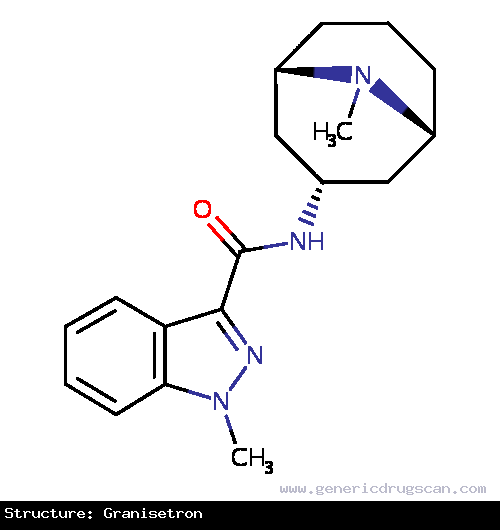Granisetron Drug: Indication, Dosage, Precaution, Side Effect , Storage, Category Type and corresponding Brands - www.genericdrugscan.com
Granisetron
Drug Status in USA : ApprovedDrug Status in Canada : Approved
pronunciation
pronounced as (gra ni' se tron)
Why is this medication prescribed?
Granisetron is used to prevent nausea and vomiting caused by cancer chemotherapy and radiation therapy. Granisetron is in a class of medications called 5-HT3 receptor antagonists. It works by blocking serotonin, a natural substance in the body that causes nausea and vomiting.
How should this medicine be used?
Granisetron comes as a tablet to take by mouth. When taken to prevent nausea and vomiting caused by chemotherapy, granisetron is usually taken 1 hour before chemotherapy is begun. A second dose may be taken 12 hours after the first dose depending on the strength. When taken to prevent nausea and vomiting caused by radiation, granisetron is usually taken within 1 hour before treatment. Follow the directions on your prescription label carefully, and ask your doctor or pharmacist to explain any part you do not understand. Take granisetron exactly as directed. Do not take more or less of it or take it more often than prescribed by your doctor.
What are the precautions to be followed?
Before taking granisetron,- tell your doctor and pharmacist if you are allergic to granisetron, alosetron (Lotronex), dolasetron (Anzemet), ondansetron (Zofran, Zuplenz), palonosetron (Aloxi, in Akynzeo), any other medications, or any of the ingredients in granisetron tablets. Ask your pharmacist for a list of the ingredients.
- tell your doctor and pharmacist what prescription and nonprescription medications, vitamins, nutritional supplements, and herbal products you are taking. Be sure to mention any of the following: fentanyl (Abstral, Actiq, Duragesic, Fentora, Lazanda, Onsolis, Subsys); ketoconazole (Nizoral), lithium (Lithobid); medications to treat migraines such as almotriptan (Axert), eletriptan (Relpax), frovatriptan (Frova), naratriptan (Amerge), rizatriptan (Maxalt), sumatriptan (Imitrex), and zolmitriptan (Zomig); methylene blue; mirtazapine (Remeron); monoamine oxidase (MAO) inhibitors including isocarboxazid (Marplan), linezolid (Zyvox), phenelzine (Nardil), selegiline (Eldepryl, Emsam, Zelapar), and tranylcypromine (Parnate); phenobarbital; selective serotonin reuptake inhibitors (SSRIs) such as citalopram (Celexa), escitalopram (Lexapro), fluoxetine (Prozac, Sarafem, in Symbyax), fluvoxamine (Luvox), paroxetine (Brisdelle, Paxil, Pexeva), and sertraline (Zoloft); and tramadol (Conzip, Ultram, in Ultracet). Your doctor may need to change the doses of your medications or monitor you carefully for side effects.
- tell your doctor if you are pregnant, plan to become pregnant, or are breastfeeding. If you become pregnant while taking granisetron, call your doctor.
What are possible side effects of this medication ?
Granisetron may cause side effects. Tell your doctor if any of these symptoms are severe or do not go away:- headache
- stomach pain
- heartburn
- constipation
- difficulty falling asleep or staying asleep
- hives
- rash
- itching
- difficulty breathing or swallowing
- shortness of breath
- dizziness, light-headedness, or fainting
- fast, slow or irregular heartbeat
- agitation
- hallucinations (seeing things or hearing voices that do not exist)
- fever
- flushing
- excessive sweating
- confusion
- nausea, vomiting, or diarrhea
- loss of coordination
- stiff or twitching muscles
- seizures
- coma (loss of consciousness)
Granisetron may cause other side effects. Call your doctor if you have any unusual problems while taking this medication.
How to store the medication and dispose it of after its use later?
Keep this medication in the container it came in, tightly closed, and out of reach of children. Store it at room temperature and away from excess heat and moisture (not in the bathroom).
Unneeded medications should be disposed of in special ways to ensure that pets, children, and other people cannot consume them. However, you should not flush this medication down the toilet. Instead, the best way to dispose of your medication is through a medicine take-back program.
Drug Category/Class
- Serotonin Antagonists
- Alimentary Tract and Metabolism
- Serotonin (5Ht3) Antagonists
- Antiemetics and Antinauseants
- Antiemetics Antagonists
- Antiemetics
- CYP2D6 Inducers
- CYP2D6 Inducers (strong)
- CYP3A4 Inhibitors
- Serotonin (5HT3) antagonists
| Prescribed | For the prevention of nausea and vomiting associated with initial and repeat courses of emetogenic cancer therapy (including high dose cisplatin), ... |
| Weight : | 312.417 |
| Structure | Granisetron |
 | |
| Formula | C18H24N4O |
Granisetron has 26 Brands listed
Search Generic Drugs alphabetically
